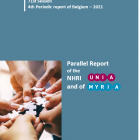Parallel report to the Committee for the Elimination of Discrimination against Women (CEDAW) (2022)
Did you know that 86% of family caregivers of people with disabilities are women? That the employment rate of women of foreign backgrounds is still lower than that of men, that they are more often employed in part-time jobs, with lower wages or in specific employment sectors, such as domestic help?
You can read about all this and many other topics in the parallel report of Unia and Myria to the UN Committee for the Elimination of Discrimination against Women (CEDAW).
As a national human rights institution, Unia submits a parallel report every time Belgium is subject to a periodic review. The UN Committees use these reports and the reports of civil society as a basis for their dialogue with Belgium regarding the human rights situation in our country and to identify areas where improvements are still necessary.
More accurate statistics to combat discrimination against women
On 31 October 2022, the CEDAW Committee submitted its 'concluding observations', which contain its concerns and recommendations to the Belgian state.
In particular, it underlines the lack of 'disaggregated' data on discrimination, inequality and violence against women. In doing so, it emphasises a recommendation from the parallel report of Unia.
Disaggregated data is data that can be analysed on the basis of several criteria in addition to gender, such as age, nationality, disability and the fact of being part of vulnerable groups (Roma, refugees, asylum-seekers...).
Disaggregated data helps having a better understanding of the obstacles for women in each area of life (employment, education, housing, health, culture, justice, media, sport...). Belgium will therefore be able to design effective policies that consider intersectional aspects of the fight against inequalities and meet the needs of the most vulnerable groups.
Comparable publications
Annual report 2022

In 2022, Unia continued to fight on behalf of discriminated citizens. In our annual report, we look back at our efforts to combat discrimination and promote equality in Belgium.
Parallel report to the Committee against torture (CAT) (2021)

Lack of reliable and centralized data on allegations of police violence, refoulement or deportation of foreigners despite the risk of torture and ill-treatment, and persistent shortcomings in the care of internees: these are some of the findings of this report.
Annual report 2020: vulnerable human rights in times of crisis

In this extraordinary year, Unia continued to fight for human rights and equality. The corona pandemic acted like a magnifying glass. Those already in a vulnerable position were often the first or hardest hit by Covid-19 or its measures.
Parallel CESCR Report (2020)
Unia and Myria present their parallel report on the implementation of the International Covenant on Economic, Social and Cultural Rights.
